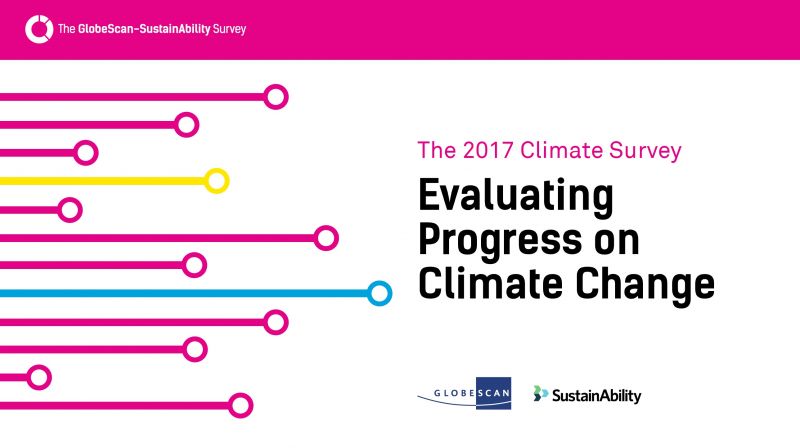The 2017 GlobeScan / SustainAbility Survey on Climate Change
Published on by Water Network Research, Official research team of The Water Network in Academic
New Survey of Experts: Bleak Assessment of Progress to Date on Climate Change
More than half of sustainability experts surveyed (55%) think that the global community is not moving fast enough to avert major damage from climate change and fewer than one-third of respondents believe that we are making good progress on implementing the global framework according to the findings of a new report “The 2017 Climate Survey: Evaluating Progress on Climate Change” by GlobeScan and SustainAbility.

The launch of these survey findings coincides with the United Nations hosting its 23rd Conference of the Parties (COP23) annual climate change conference in Bonn, Germany – the first one taking place since US President Donald Trump took office.
They have asked almost 400 global experts representing business, government, NGOs and academia across 55 countries to evaluate progress on addressing climate change generally, and specifically on implementing the Paris Agreement.
Progress is seen as limited, with only 3 percent of global respondents sharing the view that society is on track toward implementing the global framework signed in 2015.
Read full press release: GlobeScan
Read and download full report The 2017 Climate Survey: Evaluating Progress on Climate Change HERE
Media
Taxonomy
- Environment
- Climate Change
- Climate Change Adaptation
- Climate Change Resilience
- Reporting
- Monitoring & Control
- Environment
1 Comment
-
The hypothesis of the Paris Agreement leads to disaster because it distracts the world from the real threat of all life on the planet. The main root of climate change is the change in evaporation. In the pre-industrial era, organic evaporation prevailed. Now artificial evaporation accelerates.
Artificial evaporation, increase in volume and speed of turnover between the atmosphere and the earth. It is known that: "Since the beginning of the 20th century, according to UN experts, the increase in CO2 emissions was from 0.5 to 5% per year. As a result, over the last hundred years, 400 billion tons of carbon dioxide have been supplied by combustion of fuel to the atmosphere. "
Every year people irrevocably take from rivers and lakes about 2000 cubic km. Fresh water, which is about 5% of the world's rivers flow. Annually. This water goes back to the sky without structural changes, without organic matter
In the 1st cubic km there are 1000х1000х1000 = 1000000000 or 1 billion cubic m. Multiply by 2000 and get 2 trillion cubic meters. m. or 2 tr. tons of water. We believe that all this water is in the balance of the circuit. As much it rises into the atmosphere. Therefore 400 billion tons of CO2 in 100 years or 4 billion tons per year is 0.2 percent in the composition of evaporation. It is necessary to add to this even the volumes of natural biota water, it remained 100-63 = 37%. Perhaps this percentage is getting even smaller. As confirmed by reference data: "The Earth's atmosphere is to a large extent a product of living organisms. The approximate composition of the Earth's atmosphere: 78.08% nitrogen, 20.95% oxygen, a variable amount of water vapor (average about 1%), 0.93% argon, 0.038% carbon dioxide, and a small amount of hydrogen, helium, other noble gases and pollutants ". This is "an average of about 1%" - a long-obsolete figure and needs clarification. According to the carbon dioxide gas, it was calculated and determined: from 0, 038 to 0, 2%. The same research is required on the evaporation of water in two types of organic and artificial.
At the water we took away its most important link, the function - the transformation in the organic. Giant masses of water return to the atmosphere without natural structural transformations. Evaporation of water from asphalt, steam generator, from the kettle and drying dishes is artificial evaporation. They are not provided for by nature. As any change in quantity leads to a new quality, the intensive reduction of one of the links in the water cycle on a global scale has led to natural disasters, the intensity and frequency of which increases every year and leads to the complete destruction of life on the planet. And it, the destruction, has already begun.